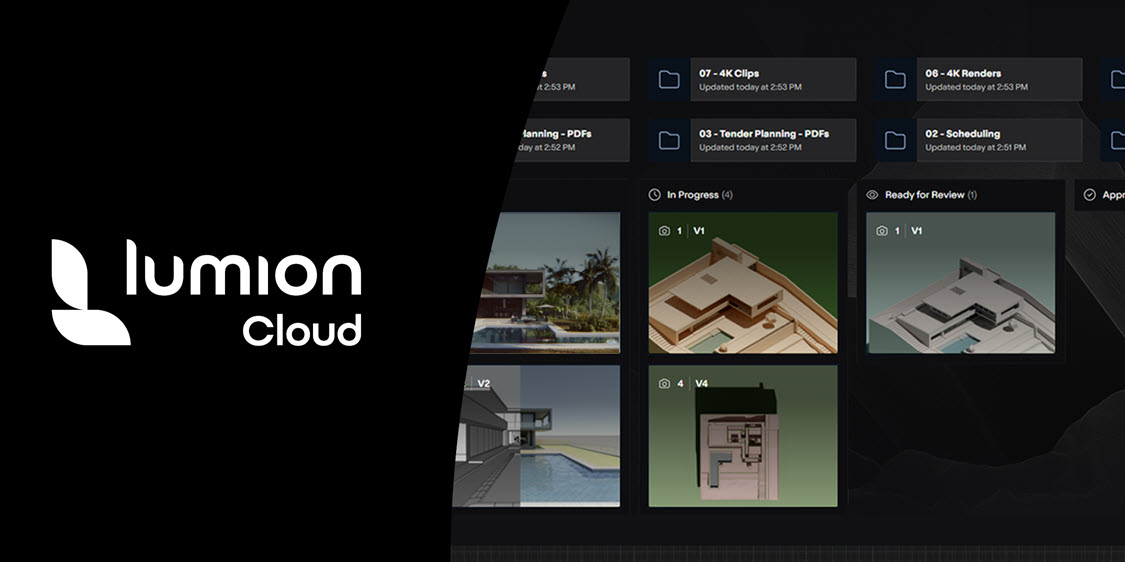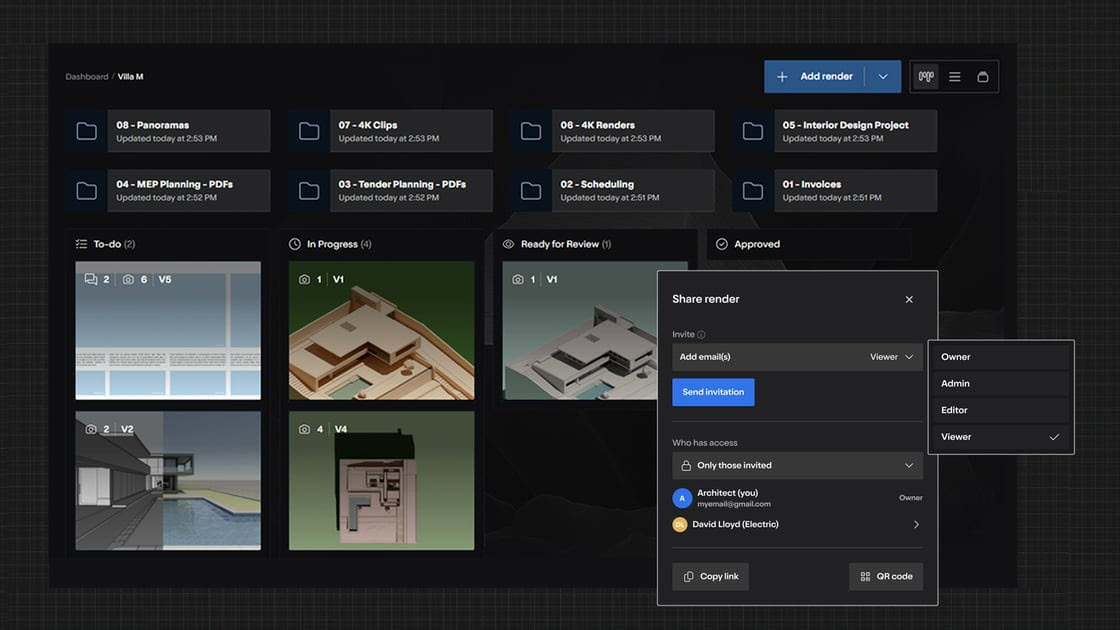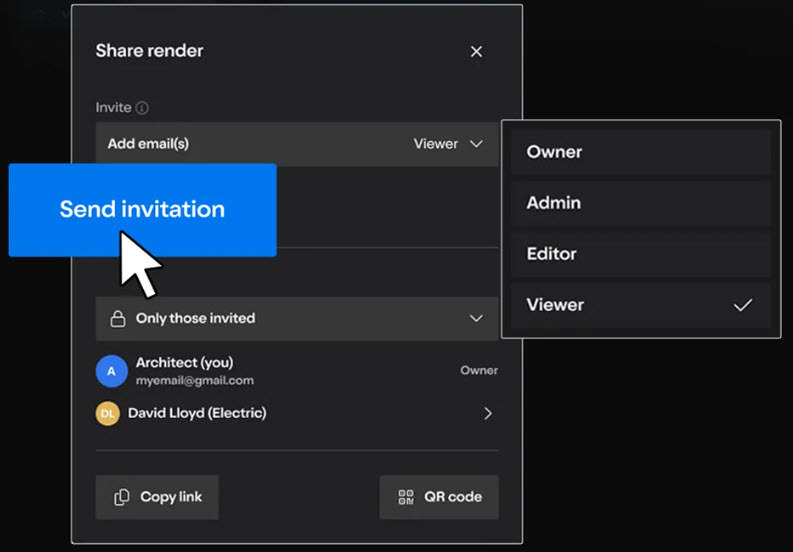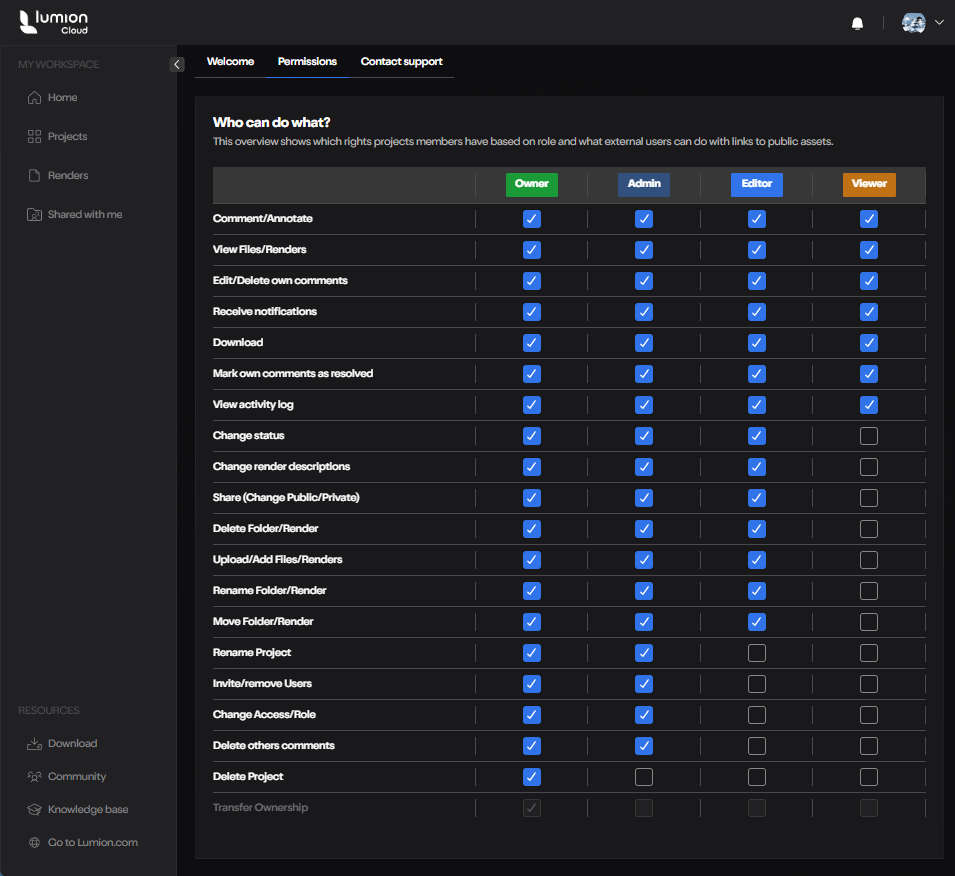How do you Manage Access and Permissions?


1. Access:
Lumion Cloud provides for secure, role-based access for internal teams and external stakeholders
1.1: Invite Users
Send invitations to new users via email to join projects.

1.2: Leave Project
Option for users to exit a project.
1.3: Member List (with Roles)
List of project members with assigned roles and email addresses.
1.4: Private/public setting
Folders or renders are only visible for project members if private/default setting) is on. Setting to public allows anyone with the link to view.
1.5: Role & Permission Assignment
Assign roles to users per project.
See Section 2 Permission s below.
2. Permissions:
You and the users who connect to Lumion Cloud do so based on the Permissions you assign for a Render or Project.
Permissions is the central module to allow you to control who gets to see what and what contributions they can make.
It provides ensure secure, granular control over who can view, edit, manage, or comment on projects and assets, supporting collaboration while protecting sensitive data and workflows.
2.1: Access Permissions
To access Permissions settings: Account dropdown > About > Permissions tab

Permissions Management provides a clear, role-based access control system for projects and assets. It uses a permissions matrix to define what actions each user role (e.g., Project Owner, Admin, Editor, Viewer) can perform, such as user management, project/asset management, and commenting.
For:
You and admins to easily understand and manage who can do what within a project, reducing the risk of unauthorized changes or confusion about access rights.
All user roles are clearly defined; permissions can be updated as needed; external users (e.g., via email invite) have limited, controlled access.
Scope:
Does not include custom, per-user permissions outside of predefined roles; advanced audit logging or permission history tracking in MVP.
2.2: Assigning Permissions Feature
Permissions matrix is accessible from the settings:

2.3: Sharing
If sharing is set to “Only those invited,” only directly invited users (by email) or those with inherited access from a parent can access.
If sharing is set to “Anyone with the link” (public), anyone with the link can access, and permissions apply.
No support for organization-wide invites at this stage.
2.4: Role Definitions
Owner:
The main project leader with full control—can manage users, settings, content, and transfer ownership. Assign to the person ultimately responsible for the project.
Admin:
A trusted team member who can manage users, settings, and content, but cannot transfer ownership. Best for senior collaborators or coordinators.
Editor:
A contributor who can upload, edit, and organize files, but cannot manage users or sharing settings. Ideal for designers and team members actively working on content.
Viewer:
Someone who can view and comment on content, and will receive notifications about updates and comments. Perfect for clients, consultants, or stakeholders who need to review and stay informed.
Example Scenarios:
If a user is an Editor on a folder, they are also an Editor for all renders/files within that folder unless a more specific role is set at the file level.
If a render is shared as “Only those invited,” and a user is not directly invited but is an Admin on the parent folder, they have access via inheritance.
If a render is set to “Anyone with the link,” all users with the link have access, but permissions apply, also though inheritance.
Concept: Permissions Inheritance in Lumion Cloud
(for those that need to understand this level of detail)
Hierarchy:
- Project
- Folder(s)
- Render(s)/File(s)
- Folder(s)
How Inheritance Works:
Permissions assigned at a higher level (e.g., Project) automatically apply to all nested items (Folders and Renders) unless a more specific permission is set at a lower level.
If a user is given access to a Project, they inherit the same access to all Folders and Renders within that Project.
If a user is given access to a specific Folder, they inherit access to all Renders within that Folder, but not to other Folders or the Project as a whole.
If a user is given access only to a specific Render, they have no access to the parent Folder or Project unless separately granted.
Example Inheritance:
If Anna is an Editor on "Office Tower" (Project), she is an Editor on all folders and renders inside it.
If Ben is a Viewer on "Exterior Renders" (Folder), he is a Viewer on "Day View" and "Night View" renders, but not on "Interior Renders." in a sibling folder.
If Carla is invited as a Guest to "Lobby" (Render), she can only access and comment on "Lobby," not on any other renders or folders.

See also:
Check out the answers to some of our users questions on managing permissions and access here:
- Knowledge Base: Lumion Cloud: FAQ
Your direct links to Articles and Guides on Lumion Cloud
- Knowledge Base: Introduction to Lumion Cloud
- Knowledge Base: What is Lumion Cloud?
- Knowledge Base: How do you access Lumion Cloud?
- Knowledge Base: My Lumion Cloud Profile
- Knowledge Base: Lumion Cloud: FAQ
- Knowledge Base: Home Screen
- Knowledge Base: Render Screen
- Knowledge Base: Projects Screen
- Knowledge Base: How do you share Lumion Cloud content?
- Knowledge Base: How do you Manage Access and Permissions?

